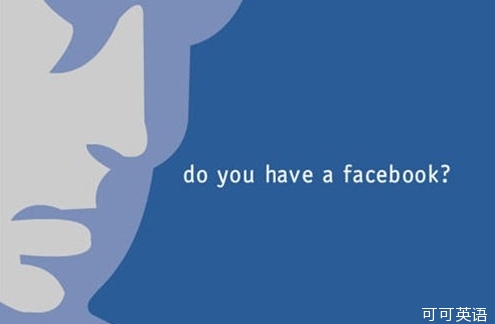Facebook is bad for you
Facebook對你沒好處
Get a life!
回到現實中過日子吧!
Using the social network seems to make people more miserable
使用Facebook這種社交網站看起來讓人們更加痛苦
Aug 17th 2013 |From the print edition

THOSE who have resisted the urge to join Facebook will surely feel vindicated when they read the latest research. A study just published by the Public Library of Science, conducted by Ethan Kross of the University of Michigan and Philippe Verduyn of Leuven University in Belgium, has shown that the more someone uses Facebook, the less satisfied he is with life.
那些堅決不加入Facebook的人們讀到最新的研究的時候肯定會覺得他們的選擇是對的。剛剛發表在《公共科學圖書館》上的一份研究顯示,一個人使用Facebook越頻繁,他對生活就越不滿意,這份研究是由美國密歇根大學的Ethan Kross和比利時魯汶大學的Philippe Verduyn領導進行的。
Past investigations have found that using Facebook is associated with jealousy, social tension, isolation and depression. But these studies have all been “cross-sectional”—in other words, snapshots in time. As such, they risk confusing correlation with causation: perhaps those who spend more time on social media are more prone to negative emotions in the first place. The study conducted by Dr Kross and Dr Verduyn is the first to follow Facebook users for an extended period, to track how their emotions change.
過去的調查研究發現使用Facebook會滋生嫉妒,社交緊張,孤立和壓抑等情緒。但是這些研究都是斷面的,換句話說就是都是簡要說明。這樣的話,他們可能把原因與相關因素給混淆了。或許花費大量時間在社交媒體上面的人們本來就是比較悲觀的人。而Kross博士和Verduyn博士指導的研究是第一個在一段時間內追蹤一群Facebook使用者情緒變化的實驗。
The researchers recruited 82 Facebookers for their study. These volunteers, in their late teens or early 20s, agreed to have their Facebook activity observed for two weeks and to report, five times a day, on their state of mind and their direct social contacts (phone calls and meetings in person with other people). These reports were prompted by text messages, sent between 10am and midnight, asking them to complete a short questionnaire.
研究人員征集了82名Facebook用戶參與他們的研究。這些參與者年齡在二十歲左右。他們同意研究人員觀察他們的Facebook活動兩周,并且每天報告五次他們的心理狀況和直接社交聯系狀況(比如電話和約會)。這些報告通過短信提示,短信發出時間為上午十點到晚上十二點之間,會要求參與者完成一份簡短的問卷。
When the researchers analysed the results, they found that the more a volunteer used Facebook in the period between two questionnaires, the worse he reported feeling the next time he filled in a questionnaire. Volunteers were also asked to rate their satisfaction with life at the start and the end of the study. Those who used Facebook a lot were more likely to report a decline in satisfaction than those who visited the site infrequently. In contrast, there was a positive association between the amount of direct social contact a volunteer had and how positive he felt. In other words, the more volunteers socialised in the real world, the more positive they reported feeling the next time they filled in the questionnaire.
研究人員分析結果的時候發現在兩份問卷間隔期使用Facebook越頻繁的參與者,填寫第二次問卷的時候情緒就越糟糕。在研究開始和結束時,參與者也被要求評價他們生活的滿意度。較多使用Facebook的人比較少使用的人滿意度下降明顯。相反地,直接社交聯系則會產生積極的影響。換句話說,參與者越多的參與真實的社交活動,他們下次填問卷的時候情緒就更積極。
A volunteer’s sex had no influence on these findings; nor did the size of his (or her) social network, his stated motivation for using Facebook, his level of loneliness or depression or his self-esteem. Dr Kross and Dr Verduyn therefore conclude that, rather than enhancing well-being, Facebook undermines it.
參與者的性別對研究結果沒有影響,參與者社交圈的大小,其使用Facebook的動機,其孤獨,抑郁或者自負的程度對結果都沒有影響。Kross博士和Verduyn博士于是得出結論,Facebook降低了人們的幸福程度。
Their study does not tease out why socialising on Facebook has a different effect from socialising in person. But an earlier investigation, conducted by social scientists at Humboldt University and Darmstadt’s Technical University, both in Germany, may have found the root cause. These researchers, who presented their findings at a conference in Leipzig in February, surveyed 584 users of Facebook aged mostly in their 20s. They found that the most common emotion aroused by using Facebook is envy. Endlessly comparing themselves with peers who have doctored their photographs, amplified their achievements and plagiarised their bons mots can leave Facebook’s users more than a little green-eyed. Real-life encounters, by contrast, are more WYSIWYG (what you see is what you get).
他們的研究沒有找出Facebook上的社交活動對不同人的社交活動影響的差異。但是更早的一份由德國的洪堡大學和達姆施塔特工業大學的社會科學家指導的調查研究發現的根本原因。這些研究人員二月份的時候在萊比錫的一個會議上展示了他們的研究結果。他們的實驗對象為584名20多歲的Facebook使用者。他們發現使用Facebook最容易引起的情緒是嫉妒。無休止的與自己的同齡人做對比,看他們P過的照片,夸大自己的成就,剽竊別人的名言,這些都讓Facebook的使用者心生嫉妒。比較而言,現實生活中的碰面則更真實。
What neither study proves is whether all this is true only for younger users of Facebook. Older ones may be more mellow, and thus less begrudging of their friends’ successes, counterfeit or real. Maybe.
這些研究都沒有證實的是這些研究結果是不是只發生在年輕人身上。年齡稍大的人或許更加成熟,這樣他們就不會太妒忌自己朋友的成功。是真是假都說不定。











